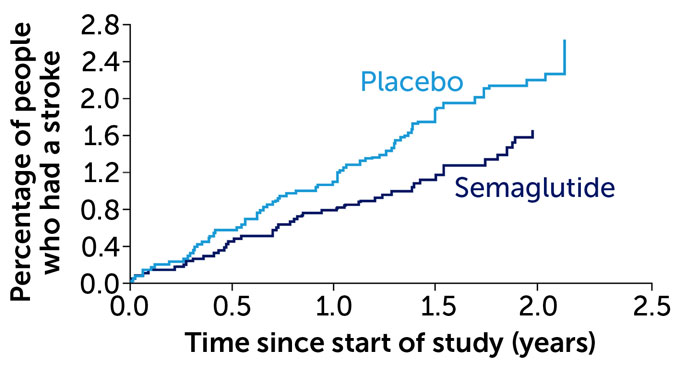What we still don’t know about Wegovy’s effect on strokes and heart attacks
A clinical trial suggests that semaglutide, a drug used to treat obesity and diabetes, may protect cardiovascular health in a broad group of people.

A diabetes-turned-weight-loss medication could be on the verge of scoring a hat trick: It may also be a cardiovascular wonder drug.
But limited results from a new and closely watched clinical trial have raised a flurry of questions. Who benefited from the drug and how long did they need to be treated? What were the side effects? And are the newly reported cardiovascular effects driven by weight loss, or is the medication working in some other way? [ Skip down to: Semaglutide FAQ ]
First approved as a diabetes drug, the molecule semaglutide mimics the gut hormone GLP-1. This hormone typically suffuses into our bloodstreams after we eat and makes us feel full, among other actions. Semaglutide essentially gives people an extra dose of that full-feeling hormone.
Taking the drug can lead to dramatic weight loss — and now, it appears, better cardiovascular health, even in people without diabetes. At least, that’s the take-home message of early clinical trial results released by Novo Nordisk, the drug’s maker, on August 8. Weekly injections of semaglutide in overweight or obese adults cut the risk of serious heart or blood vessel problems by 20 percent, the company, headquartered near Copenhagen, reported.
“It’s quite a big deal,” says David Strain, a physician at the University of Exeter Medical School in England who helped recruit patients for the trial but was not involved in collecting data and has not seen the study’s full results. “This is the first time that a drug for weight loss has shown benefits above and beyond the weight loss itself.”
Headlines have hailed the trial as a landmark. The study’s early results served up the tantalizing idea that semaglutide might prevent strokes or heart attacks in a broad group of people. In the United States alone, more than 795,000 people have strokes every year and about 805,000 people have heart attacks.
But Novo Nordisk’s brief report is sparse on details and has left many doctors and scientists awaiting the trial’s full findings. Scientists involved with the trial plan to present more information later this year.
Before making any judgments or recommendations, says cardiologist Michelle Albert of the University of California, San Francisco, the study needs to be peer-reviewed. “If the results seem sound,” says Albert, a former president of the American Heart Association, the study “opens the door for a wider range of folks benefiting from this medication. But this is all a big if.”
Other studies have suggested semaglutide has cardiovascular benefits
Semaglutide’s path to the public has been a long one. Since the mid-2000s, scientists have launched more than 300 clinical trials testing the drug. In 2017, the U.S. Food and Drug Administration approved semaglutide for use in people with type 2 diabetes, sold under the brand name Ozempic. It is now for sale in self-administered injector pens containing up to 2 milligrams of semaglutide.
About four years after Ozempic got the green light, the FDA approved a higher-dose, 2.4-milligram version of semaglutide (under the brand name Wegovy) specifically for weight management. People treated with the drug tend to be less hungry, have fewer cravings and feel more satiated after eating than those not on the drug — all factors that may translate to weight loss. In one 2021 study, people treated with the drug for more than a year lost about 15 kilograms. People who instead received a placebo lost less than 3 kilograms.
Other studies have unearthed cardiovascular clues suggesting semaglutide may do more than simply help people shed pounds. In a small trial of people with obesity and one type of heart failure, a year’s treatment with the drug seemed to improve physical abilities, researchers reported August 25 in the New England Journal of Medicine. And last year, Strain and colleagues reported that semaglutide lowered the risk of stroke in people with type 2 diabetes and high cardiovascular risk. How exactly it works remains unclear, Strain says, but it’s possible the drug reduces damage from blood flow blockages in the brain.
That kind of secondary effect may help explain the results of Novo Nordisk’s current clinical trial, called SELECT, which enrolled more than 17,000 adults age 45 and older. The trial evaluated semaglutide’s effects in people who were overweight or obese. These people did not have diabetes, but they did have cardiovascular disease, which affects the heart or blood vessels. Weekly injections reduced the number of fatal or nonfatal strokes and heart attacks, the company reported. A smaller trial funded by Novo Nordisk in 2016 reported similar results in people with diabetes treated with the drug.
But there are big questions raised by the company’s current trial that still need to be answered, Strain says. For example, how long do the cardiovascular benefits persist after people go off the drug? Weight loss, at least, doesn’t seem to endure. In one 2022 study, people regained two-thirds of the weight they had lost a year after stopping the medication. And how much of Wegovy’s cardiovascular benefits are due to slimming down versus other ways semaglutide may be tinkering with the body?
Strain suspects that weight is not the only factor. In his stroke study, his team noticed that stroke risk fell relatively quickly — before study participants lost a significant amount of weight. “That was the biggest surprise to us,” he says. “You start seeing the benefit within a few months after starting the drug.” He’s expecting to see something similar with the SELECT trial. But teasing out the different ways semaglutide affects cardiovascular health “is going to take a lot of unpacking,” he says.
Who might benefit from taking semaglutide for cardiovascular health?
UCSF’s Albert has questions about the trial’s participants. “We just know bare bones information about the population,” she says. How many of them stuck with the drug regimen and for how long? And do the drug’s side effects offset its potential utility? Semaglutide can roil the stomach, causing nasty issues like nausea, diarrhea and vomiting.
She also wonders which participants saw the reported cardiovascular benefits. “What’s their racial and ethnic background? What’s their gender? What’s their income level?” she asks. People don’t become overweight in a vacuum, Albert says. Weight issues often start in childhood and can relate to finances, neighborhood access to healthy foods and socioeconomic status. She’s curious if semaglutide’s effects are uniform across different subgroups of people.
A complete picture of a study’s findings can be difficult to piece together from a press release, says Andres Acosta, a gastroenterologist at the Mayo Clinic in Rochester, Minn. “It’s important that we wait for the full manuscript to look at the details of the results.” But the tidbits Novo Nordisk has released are certainly intriguing, he says.
Acosta is hopeful that more insurance companies will consider covering anti-obesity drugs for weight loss. Currently, the list price for Wegovy is about $1,350 per month. “That’s huge,” Albert says. “How many people can afford that?”
Acosta also thinks the study might help the public view obesity in a new light. In the United States, roughly 120 million people — about a third of the country’s population — are obese. Worldwide, that number surges to more than a billion.
“Many people still think that obesity is a disease that is purely cosmetic,” Acosta says. But studies like the Novo Nordisk trial suggest that treating obesity isn’t just about looks, he says. It’s about saving lives. “We need to stop ignoring the problem,” he says. We’re entering a new era where “obesity should be treated — and treated seriously.”
What's Your Reaction?




























































